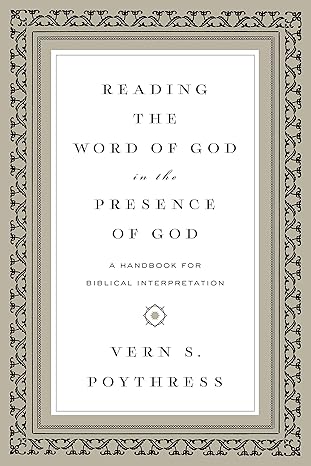A Brief Book Summary from Books At a Glance
by Steve West
Table of Contents
Part I Introductory Principles for Interpretation
1 Foundations for Interpretation
2 Principles for Interpreting the Bible
3 Complementary Starting Points for Interpretation
Part II Simple Steps in Interpretation
4 Three Simple Steps in Interpretation
5 The Three Steps as Perspectives
6 Correlation: Comparing Passages
Part III Issues with Time
7 Transmission
8 Original Contexts
9 Original Communication
Part IV Issues with Authorship
10 Dual Authorship
11 Difficulties with Authorship
Part V Issues with Language
12 Basic Linguistic Structures
13 Understanding Linguistic Subsystems
14 Units in Contrast, Variation, and Distribution
15 Meaning
16 Figurative Language
17 Words and Concepts
18 Discourse
19 Genre
20 Using Commentaries
Part VI Redemptive-Historical Interpretation
21 The History of Redemption
22 Christocentric Interpretation
23 Typology
24 Additional Stages Reflecting on Typology
25 Varieties of Analogies
26 Varieties of Types
27 Antitypes
28 Themes
Part VII Assessment
29 Hermeneutics Outline in Detail
30 Alternate Paths of Interpretation
31 The Fulfillment Approach
32 Boundaries for Interpretation
Part VIII Examples
33 Proverbs 10:1
34 Psalm 4:8
35 Amos 1:3
Conclusion
Appendix A: Redeeming How We Interpret
Appendix B: Secular Views of Meaning
Appendix C: Interpreting Human Texts
Appendix D: Redeemed Analogues to Critical Methods
Appendix E: Philosophical Hermeneutics
Summary
Part I: Introductory Principles for Interpretation
Parts I & II of this book can help beginners learn basic principles of interpreting the Bible, but as the book goes on it adds layers of complexity. We need to start with the necessity of wholeheartedly loving God. Loving God motivates us to learn about him and praise him for what we learn. Loving God sums up our duty to God, and therefore sums up our duty in interpreting the Bible. The redeemed love God because he saves us and unites us with Christ. God himself empowers us by his Spirit, so that we can understand his word and have communion with him. As our sovereign king, God’s lordship matters when we study Scripture. His lordship can be helpfully thought of in terms of authority, control, and presence (all three of which presuppose the other two). Scripture reveals this triad, but also the ethical triad of normative, situational, and existential perspectives (i.e., the norms of God’s commands, the concrete situations in which they apply, and the individual’s motives and heart). Scripture calls us to respond to God’s lordship and our ethical obligations before him. Christ is the way, and there is no recipe or plan that can lead us to truth in the Bible apart from obedience to him. Scripture is a God-given means of grace that the Spirit uses to sanctify us and conform us to the image of Christ.
God is a speaking, communicating God, and the Bible is his speech in written form. The Father is the speaker, the Son is the logos Word, and the Spirit is God’s breath. God spoke the universe into existence, he spoke to individuals, and he spoke climactically through his Son. Now he speaks through the Bible which is a permanent canon. The God who speaks is the Lord and Creator of all: the Bible is his text, and we are the recipients. He is sovereign, governing the entire world and all of history by his speech. God speaks covenants into being, and the Bible is a covenantal document. When we read the Bible rightly, we meet God in his presence and control; God’s word is our authority. He is the primary author, even though there are multiple human authors. God is the main character of the Bible. It is Christocentric, oriented to the history of redemption, and shows how the first and second comings of Christ are central to history. The human recipients are image bearers of God. We have fallen into sin but are redeemed in Christ. In our lives we grow in holiness but continue to sin. As we study the Bible we learn the theology of the whole, exegete individual passages, and learn hermeneutics; these three things help and correct each other. Tradition must not be ignored, but only the Bible is infallible.
Reading and listening are simple approaches to learning the Bible, and they are foundational for more complex interpretive strategies. We should also memorize and meditate. When we read we should think about the normative, situational, and existential aspects of interpretation and application. Maintaining all three perspectives keeps us balanced. This book focuses on the present-time approach, which is that God is speaking in the present to the recipient, who is always responsible to God. We read the Bible as a completed canon of what God says to us now. . . .
[To continue reading this summary, please see below....]The remainder of this article is premium content. Become a member to continue reading.
Already have an account? Sign In
